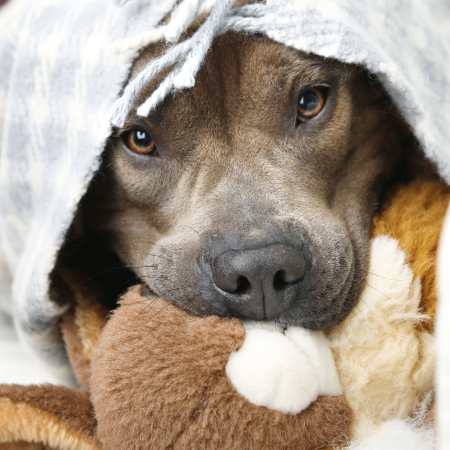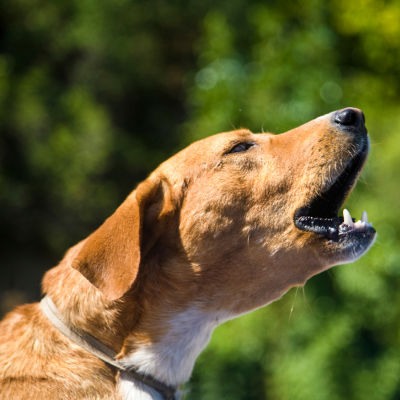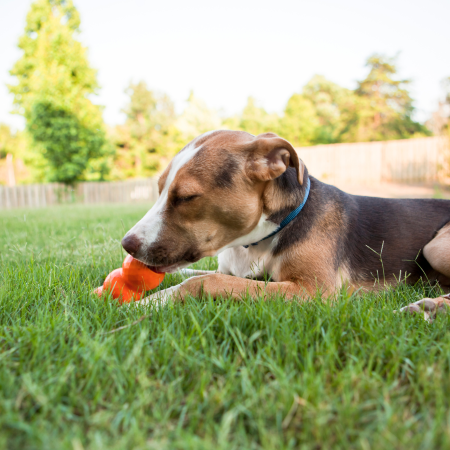The warmer months normally include a time for loud noises including fireworks and thunderstorms. Even if your pet has made it through bouts of storms in the past and fireworks booms around the fourth of July, it's important to create a safe place at home to help our pets feel protected during future rounds of loud sounds.
There is always more we can do to help keep our dogs calm - especially those that are extra sensitive to loud noises. The PetHub team has tips on how to help your pet feel more relaxed and comfortable and face their noise anxiety with ease.
We had the chance to chat with Robin Bennett, a Certified Professional Dog Trainer, and get some great tips for pet parents to help their dogs conquer sound phobias (and conquer the next firework show with less of a fear response!)
.png?v1.uwC8zqulP7ETVPQ.c6xoT7FcMXaeJ)
"Pet parents can work with their dog throughout the year to help desensitize their noise sensitivities," Bennett says.
Anytime is the right time to start with training pets using positive reinforcement training, but the summer months may be a reminder for a pet parent based on increased frequency of noise events.
She recommends positive training behavior modification to desensitize your dog to things like fireworks, storms, or other loud noises to reduce dog noise sensitivity in dogs.

What are the symptoms of noise sensitivity in dogs?
Many dogs can tell a storm is brewing long before humans are aware of changes in barometric pressure. It's common for dogs to exhibit physical signs of anxiety related to an anticipated traumatic incident like thunderstorms well in advance of the event taking place.
If dog owners are able to read their pet's fearful behavior and body language early on, they may be able to mitigate more severe fearful responses and ensure their pet is kept as calm as possible. Here are some common signs to be aware of for pets who may be showing noise sensitive anxiety.

Symptoms of Dog Anxiety:
If your dog is presenting signs like what's listed below, they may be anxious:
- Dogs barking to excess
- Behavioral problems like (destructive chewing or pawing on furniture)
- Changes in bathroom behavior like defecating indoors
- Panting
- Drooling
- Restlessness and/or pacing
- Aggression
Positive Training Techniques for Dogs with Sensitivities to Loud Noises
1. Get your dog comfortable with their own “safe haven”
Noise sensitivity in dogs can increase with time, so establishing a quiet and safe space for your pet to escape to can be helpful.
Robin says a great place to start is by getting your pup used to a place in your house where she feels comfortable.
This could be a bathroom, laundry room, basement or even a crate. Giving your dog her own safe space (and getting her comfortable with their safe spot pre-stressor) gives her a calm and quiet area to go to when she gets stressed, which will reduce the likelihood that it will react negatively to a loud noise.
A great way to start getting your dog comfortable with their safe spot is by rewarding them with praise and treats each time they visit the area that has been set up with calming agents like comfy blankets and noise machines.
Spending time together in their safe haven at times when loud noises aren't happening allows your pup to feel comfortable with the area you've helped to establish as their spot to tuck away.
2. Get your dog used to using puzzle and mental enrichment toys
Introduce your dog to puzzle and mental enrichment toys before he is stressed and make sure he is comfortable playing with it. Robin recommends using stuffed Kong toys or a snuffle mat - basically any toy that your dog has to work for in order to get the treat. A dog solving a problem and gaining a reward allows them to be distracted during times when noise aversions may have been shown in the past.
Robin cautions that the worst thing you can do is bring out the toy when the dog gets stressed without introducing him to the toy when he isn’t anxious. If you introduce the puzzle toy when the dog is stressed, he might associate it with being stressed and it will not act as a calming method during times of distress, preventing it from being an effective treatment tool for a pupper with sound sensitivities.
3. Use sound-specific music files made for dogs
There are a lot of resources on the internet to help you desensitize your dog to specific noises (like fireworks!)
Robin says the best way to do this is to start by playing the sound that may normally cause a fear response really low in the house (when your dog is relaxed) and see how she responds by observing their body language.
You are looking for signs of stress, Robin adds. The goal is to play the sounds low and do something fun with your dog so she hears the scary noise but she’s having fun and not stressed out by the sound.
_0.png?PxcTbWJDztJIO0JgIlyOD3GyVLwFmrat)
Consider other treatments that can help with sound sensitivity in dogs
The average age for a dog to begin showing noise phobias can vary but can develop with time. As with any behavior change, ruling out medical issues like chronic pain is important when providing proper tools to help your pet feel comfortable.
- Speak with a veterinarian. A telehealth conversation can be a start for understanding your pet's new reactions to noises and the vet may be able to provide management advice to try. If those tips don't help, consider bringing your pup in to be carefully evaluated by a veterinarian.
- A vet may offer prescription medications as part of a treatment plan that can help a pet feel more calm
- Pressure wraps, like a Thunder Shirt can be used as a standalone item or in addition to other tools used to help with fear responses
- Over the counter calming chews can be used for dogs with anxiety
- Radios or sound machines can help to drown out noises that are causing reactions in pets that are super sensitive to certain sounds
These resources will help a dog deal with loud sounds in a more calm way
These are some simple steps you can start working on right now. “It’s well worth the effort to make their life - and your life, frankly - better every 4th of July, New Year’s Eve, or any other situation with loud noises,” Robin says. While your dog won’t be desensitized overnight, it’s well worth the time when you look at the lifespan of your dog, she added.
To learn more about Robin and The Dog Gurus, head over to their website. They also have a great online puppy school available to guide you through your puppy’s first six months of life!
Robin is one of the leading experts on dog training. As a Certified Professional Dog trainer, she has over 20 years of experience in the dog training world and founded one of the largest dog training companies in Virginia. She is currently one of the co-founders of The Dog Gurus and has been using her expertise in “reading dogs” to teach families how to train their pets as well as helping others in the pet care industry keep dogs safe.



